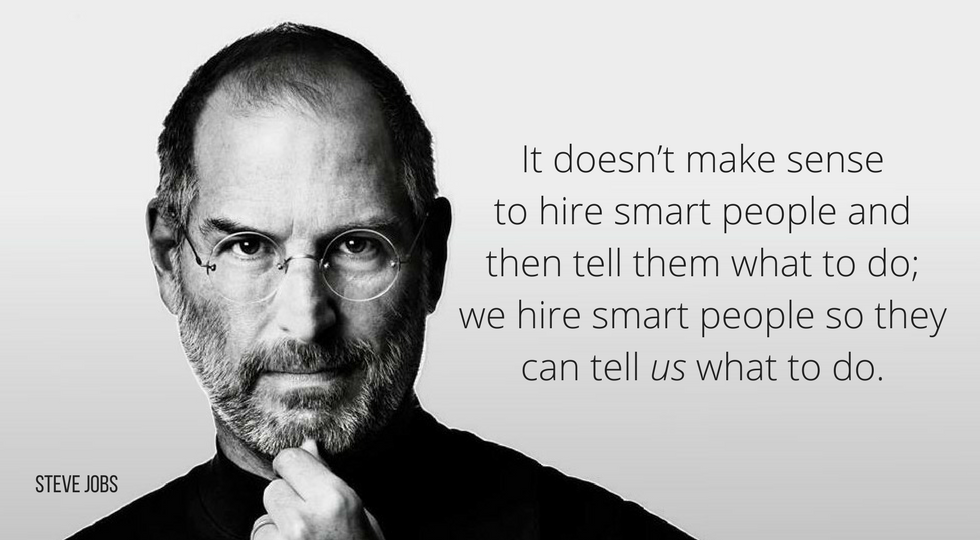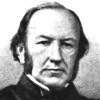Sometimes in a vision, I see a world of happy human beings, all vigorous, all intelligent, none of them oppressing, none of them oppressed. A world of human beings aware that their common interests outweigh those in which they compete, striving toward those really splendid possibilities that the human intellect and the human imagination make possible such a world as I was speaking of can exist if everyone chooses that it should. And if it does exist, if it does come to exist, we shall have a world very much more glorious, very much more splendid, more happy, more full of imagination and happy emotions, than any world that the world has ever known before.
Bertrand Russell (1872-1970) English mathematician and philosopher
Interview by Woodrow Wyatt, BBC TV (1959)
Collected in Bertrand Russell's BBC Interviews (1959) [UK] and Bertrand Russell Speaks His Mind (1960) [US]. Reprinted (abridged) in The Humanist (1982-11/12), and in Russell Society News, #37 (1983-02).
Quotations about:
collaboration
Note not all quotations have been tagged, so Search may find additional quotes on this topic.
And so when I hear so much impatient and irritable complaint, so much readiness to replace what we have by guardians for us all, those supermen, evoked somewhere from the clouds, whom none have seen and none are ready to name, I lapse into a dream, as it were. I see children playing on the grass; their voices are shrill and discordant as children’s are; they are restive and quarrelsome; they cannot agree to any common plan; their play annoys them; it goes poorly. And one says, let us make Jack the master; Jack knows all about it; Jack will tell us what each is to do and we shall all agree. But Jack is like all the rest; Helen is discontented with her part and Henry with his, and soon they fall again into their old state. No, the children must learn to play by themselves; there is no Jack the master. And in the end slowly and with infinite disappointment they do learn a little; they learn to forbear, to reckon with anther, accept a little where they wanted much, to live and let live, to yield when they must yield; perhaps, we may hope, not to take all they can. But the condition is that they shall be willing at least to listen to one another, to get the habit of pooling their wishes. Somehow or other they must do this, if the play is to go on; maybe it will not, but there is no Jack, in or out of the box, who can come to straighten the game.
Learned Hand (1872-1961) American jurist
“Democracy: Its Presumptions and Realities,” speech, Federal Bar Association, Washington, DC (1932-03-08)
(Source)
Collected in The Spirit of Liberty (1953).
You know no Nation has a monopoly on good things, each one has something that the others could well afford to adopt.
A new Power is rising. Against it the old allies and policies will not avail us at all. There is no hope left in Elves or dying Númenor. This then is one choice before you, before us. We may join with that Power. It would be wise, Gandalf. There is hope that way. Its victory is at hand; and there will be rich reward for those that aided it. As the Power grows, its proved friends will also grow; and the Wise, such as you and I, may with patience come at last to direct its course, to control it. We can bide our time, we can keep our thoughts in our hearts, deploring maybe evils done by the way, but approving the high and ultimate purpose: Knowledge, Rule, Order; all the things that we have so far striven in vain to accomplish, hindered rather than helped by our weak or idle friends. There need not be, there would not be, any real change in our designs, only our means.
J.R.R. Tolkien (1892-1973) English writer, fabulist, philologist, academic [John Ronald Reuel Tolkien]
The Lord of the Rings, Vol. 1: The Fellowship of the Ring, Book 2, ch. 1 “The Council of Elrond” [Saruman to Gandalf] (1954)
(Source)
Serious artist or weekend amateur, it’s more fun cooking for company in company.
Julia Child (1912-2004) American chef and writer
Julia Child & More Company, Introduction (1979)
(Source)
Our democracy is not the buildings, not the monuments. It’s you being willing to work to make things better and being willing to listen to each other and argue with each other and come together and knock on doors and make phone calls and treat people with respect.
Barack Obama (b. 1961) American politician, US President (2009-2017)
Staff Farewell, Joint Base Andrews, Maryland (20 Jan 2017)
(Source)
Language is not a protocol legislated by an authority, but rather a wiki that pools the contributions of millions of writers and speakers, who ceaselessly bend the language to their needs and who inexorably age, die, and get replaced by their children, who adapt the language in their turn.
Steven Pinker (b. 1954) Canadian-American cognitive psychologist, linguist, author
The Sense of Style, Prologue (2014)
(Source)
But since, as Plato has admirably expressed it, we are not born for ourselves alone, but our country claims a share of our being, and our friends a share; and since, as the Stoics hold, everything that the earth produces is created for man’s use; and as men, too, are born for the sake of men, that they may be able mutually to help one another; in this direction we ought to follow Nature as our guide, to contribute to the general good by an interchange of acts of kindness, by giving and receiving, and thus by our skill, our industry, and our talents to cement human society more closely together, man to man.
[Sed quoniam, ut praeclare scriptum est a Platone, non nobis solum nati sumus ortusque nostri partem patria vindicat, partem amici, atque, ut placet Stoicis, quae in terris gignantur, ad usum hominum omnia creari, homines autem hominum causa esse generatos, ut ipsi inter se aliis alii prodesse possent, in hoc naturam debemus ducem sequi, communes utilitates in medium afferre mutatione officiorum, dando accipiendo, tum artibus, tum opera, tum facultatibus devincire hominum inter homines societatem.]
Marcus Tullius Cicero (106-43 BC) Roman orator, statesman, philosopher
De Officiis [On Duties; On Moral Duty; The Offices], Book 1, ch. 7 (1.7) / sec. 22 (44 BC) [tr. Miller (1913)]
(Source)
Original Latin. Referring to Plato, Epistle 9, to Archytas: "No one of us exists for himself alone, but one share of our existence belongs to our country, another to our parents, a third to the rest of our friends, while a great part is given over to those needs of the hour with which our life is beset." [tr. Bury (1966)]
Alternate translations:
"But seeing (as is excellently said by Plato) we are not born for ourselves alone; but that our native country, our friends and relations, have a just claim and title to some part of us;" and seeing whatsoever is created on earth was merely designed (as the Stoics will have it) for the service of men; and men themselves for the service, good, and assistance of one another; we certainly in this should be followers of Nature, and second her intentions; and by producing all that lies within the reach of our power for the general interest, by mutually giving and receiving good turns, by our knowledge, industry, riches, or other means, should endeavour to keep up that love and society, that should be amongst men.
[tr. Cockman (1699)]
But, according to the excellent observation of Plato, "since we were not born for ourselves alone, our country and our friends have separate claims upon us." The produce of the earth, according to the Stoics, is intended wholly for the use of man; but men were designed for the service of men, by being made able to communicate reciprocal benefits to each other. In this view we ought to follow nature as our guide; and, by the exchange of services, by giving and receiving, to bring forward general advantages for the common good. We ought, by knowledge, industry, and wealth, to bind closer the society of men with men.
[tr. McCartney (1798)]
But (as has been strikingly said by Plato) we are not born for ourselves alone, and our country claims her share, and our friends their share of us; and, as the Stoics hold, all the earth produces is created for the used of man, so men are created for the sake of men, that they may mutually do good to one another; in this we ought to take nature for our guide, to throw into the public stock the offices of general utility by a reciprocation of duties; sometimes by receiving, sometimes by giving, and sometimes to cement human society by arts, by industry, and byh our resources.
[tr. Edmonds (1865)]
But since, as it has been well said by Plato, we are not born for ourselves alone; since our country claims a part in us, our parents a part, our friends a part; and since, according to the Stoics, whatever the earth bears is created for the use of men, while men were brought into being for the sake of men, that they might do good to one another, -- in this matter we ought to follow nature as a guide, to contribute our part to the common good, and by the interchange of kind offices, both in giving and receiving, alike by skill, by labor, and by the resources at our command, to strengthen the social union of men among men.
[tr. Peabody (1883)]
But since our life, to quote the noble words of Plato, has not been given to us for ourselves alone (for our country claims a share, our friends another), and since, as the Stoics hold, all the products of the earth are destined for our use and we are born to help one another, we should here take nature for our guide and contribute to the public good by the interchange of acts of kindness, now giving, now receiving, and ever eager to employ our talents, industry and resources in strengthening the bonds of human society.
[tr. Gardiner (1899)]
Plato wrote brilliantly on this point: "We have not been born for ourselves alon; our native land claims a portion of our origin, our friends claim a portion." The Stoics like to repeat that everything that comes into being in the world is created for the benefit of man, that even men themselves are born for mankind's sake, that people can be helpful among themselves, one to another. The Stoics say that we should follow nature's lead in this and that we should contribute to the public benefit by the mutual interchange of obligations, by both giving and receiving. By our skills, by our efforts, by our capacities we should thus link men together into a human society.
[tr. Edinger (1974)]
The main ingredient of stardom is the rest of the team.
John Wooden (1910-2010) American basketball player and coach
They Call Me Coach, ch. 25, epigraph (1972)
(Source)
A lot of companies — I know it sounds crazy — but a lot of companies … hire people to tell them what to do. We hire people to tell us what to do. We figure we’re paying them all this money; their job is to figure out what to do and tell us.
Steve Jobs (1955-2011) American computer inventor, entrepreneur
“Steve Jobs: ‘Computer Science Is A Liberal Art’,” interview with Terry Gross, Fresh Air, NPR (1996)
(Source)
There are a number of variants on this quotation. A common one: "It doesn't make sense to hire smart people and then tell them what to do; we hire smart people so they can tell us what to do."
Don’t spit in the soup. We’ve all got to eat.
Lyndon B. Johnson (1908-1973) American politician, educator, US President (1963-69)
(Attributed)
A favorite political comment of Johnson's, going back at least as far as when he was US Senate majority leader. It's sometimes labeled as an old adage from Texas politics.
The core metaphor of "spitting in the soup" (ruining/sabotaging something) long predates Johnson; the phrase's application to politics ("don't make things so toxic or failed that you hurt your colleagues and the political institution itself") seems more applicable than ever.
The connection to Johnson seems to have solidified with its inclusion in Jack Shepherd, Christopher Wren, eds., Quotations from Chairman LBJ, Epigraph (1968).
As a verbal comment, and given folk wanting to elicit (or mock) Johnson's Texas accent, variants include "we all got to eat," "we've all gotta eat," etc.
There are no problems which we cannot solve together, and very few that any of us can settle by himself.
Lyndon B. Johnson (1908-1973) American politician, educator, US President (1963-69)
Speech (1964-11-28), Press Conference, LBJ Ranch, Johnson City, Texas
(Source)
Regarding the Atlantic Alliance (NATO). Variant: "There are no problems we cannot solve together, and very few that we can solve by ourselves."
Presidents quickly realize that while a single act might destroy the world they live in, no one single decision can make life suddenly better or can turn history around for the good.
Lyndon B. Johnson (1908-1973) American politician, educator, US President (1963-69)
Speech (1966-09-13), Signing a Bill Extending the Peace Corps Act, Georgetown University
(Source)
Broader context:
To hunger for use, and to go unused, is the worst hunger of all. [...] It is true that few men have the power by a single act of theirs or in a single lifetime to shape history for themselves. Presidents, for example, quickly realize that while a single act might destroy the world they live in, no one single decision can make life suddenly better or can turn history around all for the good. But Presidents do know that a nation is the sum total of what we all do together; that the deeds and desires of each citizen fashion our character and shape our world -- just as one tiny drop of water after another will ultimately make a mighty river.
Let us not despair but act. Let us not seek the Republican answer or the Democratic answer but the right answer. Let us not seek to fix the blame for the past — let us accept our own responsibility for the future.
John F. Kennedy (1917-1963) US President (1961-63)
Speech, Loyola College Alumni Banquet, Baltimore (18 Feb 1958)
(Source)
If all the good people were clever;
And all clever people were good,
The world would be nicer than ever
We thought that it possibly could.But somehow ’tis seldom or never
The two hit it off as they should,
The good are so harsh to the clever,
The clever, so rude to the good!Elizabeth Wordsworth (1840–1932) English poet, novelist, author
“Good and Clever,” st. 1-2 (1890)
(Source)
Two are better than one, because they have a good return for their labor: If either of them falls down, one can help the other up. But pity anyone who falls and has no one to help them up. Also, if two lie down together, they will keep warm. But how can one keep warm alone? Though one may be overpowered, two can defend themselves. A cord of three strands is not quickly broken.
The Bible (The Old Testament) (14th - 2nd C BC) Judeo-Christian sacred scripture [Tanakh, Hebrew Bible], incl. the Apocrypha (Deuterocanonicals)
Ecclesiastes 4:9-12 [NIV (2011 ed.)]
(Source)
Alternate translations:
Two are better than one; because they have a good reward for their labour. For if they fall, the one will lift up his fellow: but woe to him that is alone when he falleth; for he hath not another to help him up. Again, if two lie together, then they have heat: but how can one be warm alone? And if one prevail against him, two shall withstand him; and a threefold cord is not quickly broken.
[KJV (1611)]
Better two than one by himself, since thus their work is really profitable. If one should fall, the other helps him up; but woe to the man by himself with no one to help him up when he falls down. Again: they keep warm who sleep two together, but how can a man keep warm alone? Where one alone would be overcome, two will put up resistance; and a threefold cord is not quickly broken.
[JB (1966)]
Two are better off than one, because together they can work more effectively. If one of them falls down, the other can help him up. But if someone is alone and falls, it's just too bad, because there is no one to help him. If it is cold, two can sleep together and stay warm, but how can you keep warm by yourself? Two people can resist an attack that would defeat one person alone. A rope made of three cords is hard to break.
[GNT (1976)]
Two are better off than one, in that they have greater benefit from their earnings. For should they fall, one can raise the other; but woe betide him who is alone and falls with no companion to raise him! Further, when two lie together they are warm; but how can he who is alone get warm? Also, if one attacks, two can stand up to him. A threefold cord is not readily broken!
[JPS (1985)]
Two are better than one because they have a good reward for their toil. For if they fall, one will lift up the other, but woe to one who is alone and falls and does not have another to help. Again, if two lie together, they keep warm, but how can one keep warm alone? And though one might prevail against another, two will withstand one. A threefold cord is not quickly broken.
[NRSV (1989 ed.)]
Many times a day I realize how much my own outer and inner life is built upon the labors of my fellow men, both living and dead, and how earnestly I must exert myself in order to give in return as much as I have received. My peace of mind is often troubled by the depressing sense that I have borrowed too heavily from the work of other men.
Albert Einstein (1879-1955) German-American physicist
“What I Believe,” Forum and Century (Oct 1930)
(Source)
Einstein crafted and recrafted his credo multiple times in this period, and specifics are often muddled by differing translations and by his reuse of certain phrases in later writing. The Forum and Century entry appears to be the earliest. Some important variants:
A hundred times every day I remind myself that my inner and outer life are based on the labors of other men, living and dead, and that I must exert myself in order to give in the same measure as I have received and am still receiving. I am strongly drawn to a frugal life and am often oppressively aware that I am engrossing an undue amount of the labor of my fellow-men.
— "The World As I See It [Mein Weltbild]" [tr. Bargmann (1954)]
A hundred times every day I remind myself that my inner and outer life depend on the labours of other men, living and dead, and that I must exert myself in order to give in the same measure as I have received and am still receiving. I am strongly drawn to the simple life and am often oppressed by the feeling that I am engrossing an unnecessary amount of the labor of my fellowmen.
— "The World As I See It [Mein Weltbild]" [tr. Harris (1934)]
I am often troubled by the thought that my life is based to such a large extent on the work of my fellow human beings, and I am aware of my great indebtedness to them.
[Oft bedrückt mich der Gedanke, in welchem Maße mein Leben auf der Arbeit meiner Mitmenschen aufgebaut ist, und ich weiß, wie viel ich Ihnen schulde.]
— Reduced variant in "My Credo [Mein Glaubensbekenntnis]" (Aug 1932)
Conversation enriches the understanding, but solitude is the school of genius.
Edward Gibbon (1737-1794) English historian
Decline and Fall of the Roman Empire, Vol. 5, ch. 50 (1788)
(Source)






















